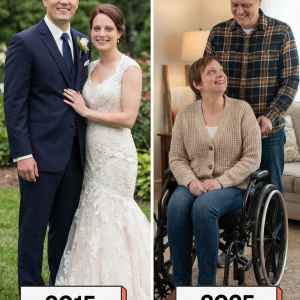What started as just another sunny Saturday morning quickly became the moment everything I thought I knew about my life shattered into a million pieces. The sun was out, a gentle breeze rustled through the blooming trees, and I was on my way to my mother-in-law’s place—a mere ten minutes from my own house—to browse the items she was offloading in a “downsizing” garage sale. My name is Bella Roberts, and I hadn’t stepped foot in Margaret’s garage in months. Surely, I thought, I’d only find old trinkets and furniture nobody wanted anymore. I couldn’t have been more wrong.
My marriage to Aaron was undeniably strained, yet I desperately clung to the hope that a small outing like this might offer a much-needed distraction from our shared grief. Five years married, two devastating pregnancies lost, and a silent, growing chasm between us—still, I believed our bond remained intact. Margaret’s pervasive influence over our household had always been a quiet source of tension. Even though she lived an hour away, she had a knack for inserting herself into every holiday gathering, every minor decision, and, I deeply suspected, into the delicate fabric of my marriage itself. When Aaron and I first tied the knot, I envisioned a simple, happy nuclear family of three—just us and the children we would raise. Instead, Margaret swept in and out of our home like a force of nature: insisting on decorating for Christmas in July, relentlessly critiquing my cooking, and never failing to undermine my voice whenever Aaron needed to hear a different perspective. After five years and two heart-wrenching miscarriages, I tolerated it all for the sake of peace—but my patience, I was beginning to realize, had its limits.
The Dream of Daisy and a Mother’s Unconditional Love
Our lives took an unexpected turn when we discovered I was pregnant with our first child. Finally, the dream I’d cherished for as long as I could remember felt incredibly real. I threw myself into preparations: soft pastel paint on the nursery walls, shelves overflowing with tiny onesies and plush toys, and, most precious of all, a hand-crocheted blanket in delicate pink and ivory.
For weeks, I sat by the window, yarn flowing through my fingers, imagining sweet Daisy nestled within those stitches, her tiny head resting against my shoulder. Every single loop in that blanket symbolized my boundless, unconditional love; every stitch was a silent promise of protection. I pictured her first gummy smile, her wobbly first steps, and the tender moment I would tuck her into bed at night—safe, warm, and utterly cherished.
But on the day Daisy arrived, complications erupted. Inexplicable turmoil, frantic doctors rushing around, and then a chilling emptiness when they carried her away. I awoke alone, my face streaked with tears, in a cold, sterile hospital room. Aaron’s face was unreadable, a mask of pain. A soft, distant voice delivered the devastating news: Daisy had passed away. Heartbroken and utterly disoriented, I could only whisper, “This can’t be real.”
In the agonizing months that followed, I couldn’t bring myself to even look at the pastel nursery or the tiny clothes folded neatly in her dresser. My husband retreated deep into his work, and our communication dwindled to nothing more than logistical updates. I mourned not only for Daisy, but for the beautiful life I thought was destined to be ours. I felt hollow, consumed by uncontrollable grief, unable to find comfort even in Aaron’s arms. And through it all, Margaret swooped in, offering what she called “consolation” and “advice,” her constant presence an unbearable reminder that I’d lost my child—and perhaps, in the process, lost myself too.





